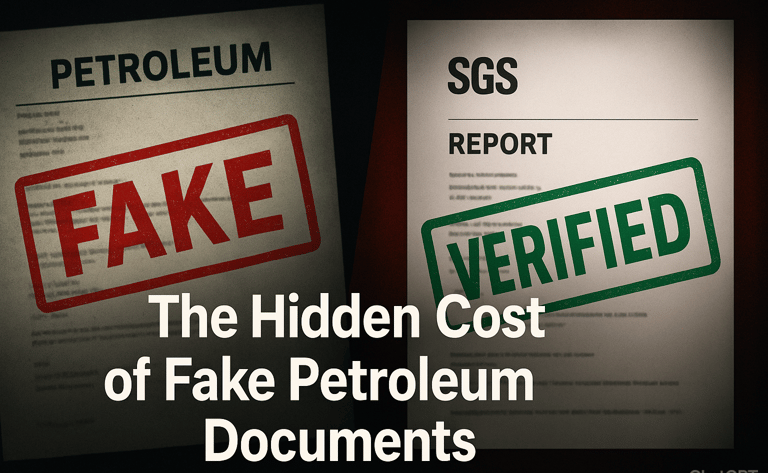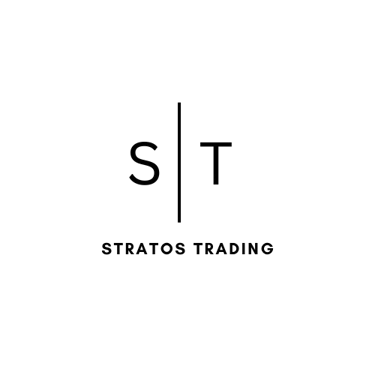The Hidden Cost of Fake Petroleum Documents — Why Verification Saves Millions
In oil and gas trading, documents move faster than product. A single PDF can represent millions of dollars, multiple jurisdictions, and weeks of negotiation. Unfortunately, those same documents are also where most losses begin.
Stratos Trading
10/7/20253 min read


🛢️ Introduction
In oil and gas trading, documents move faster than product. A single PDF can represent millions of dollars, multiple jurisdictions, and weeks of negotiation. Unfortunately, those same documents are also where most losses begin.
The harsh truth is simple: fraud doesn’t always look like fraud.
It looks like an official SGS certificate.
It looks like a tank storage receipt on company letterhead.
It looks like opportunity — until it doesn’t.
At Stratos Trading, we’ve seen the damage that one forged document can cause. Entire deals collapse, reputations are questioned, and legitimate buyers lose capital chasing illusions. The cost of a fake petroleum document isn’t just financial — it’s operational, legal, and reputational.
⚠️ The Illusion of Legitimacy
Most fraudulent offers don’t arrive as obvious scams. They’re polished. They include correct terminology, believable volumes, and even stolen or recycled SGS test data. The problem isn’t that they’re sloppy — it’s that they’re sophisticated.
Scammers now use design software and insider templates that mimic genuine refinery or inspection paperwork. These documents often:
Use authentic company names but falsified report numbers
Copy signatures from legitimate deals
Alter densities or quantities to justify unrealistic volumes
Contain metadata linking to unrelated authors or timestamps
The result? A set of “perfect-looking” documents that would fool even experienced traders — unless they’ve seen the real ones up close.
🧩 Why Standard Due Diligence Isn’t Enough
Most traders perform some level of due diligence. They’ll check company websites, request IDs, or verify bank letters. But fraud in the petroleum sector isn’t beaten by Google searches.
You can’t detect document fraud with casual inspection — it takes forensic analysis.
That means verifying:
Document provenance: Was it truly issued by the claimed authority?
Technical accuracy: Are density, volume, and temperature consistent with real EN590 or D6 profiles?
Timeline integrity: Do dates and sampling events align with physical storage and outturns?
Digital fingerprints: Does the file metadata confirm its authenticity — or expose a clone?
Without these layers, due diligence is like checking the spelling on a counterfeit bill and calling it real.
🔍 The Stratos Approach
At Stratos Trading, our fraud prevention and consulting arm was built from first-hand trading exposure, not theory.
We operate as active buyers in the petroleum market — meaning we’ve seen every variation of legitimate and illegitimate paperwork there is.
Our verification process combines:
Forensic technical review of petroleum documentation
Cross-verification with inspection agencies and terminals
Market intelligence tracking of recurring fraudulent entities
Pattern recognition from years of real deal flow
This isn’t surface-level verification — it’s a professional audit built to protect serious capital.
💸 The Real Cost of Ignoring Verification
When a forged document enters a deal chain, the damage compounds:
Time Lost: Weeks wasted pursuing a transaction that will never close.
Reputation Damage: Genuine partners lose trust after being linked to bad paperwork.
Financial Exposure: Deposits, logistics fees, or legal costs spiral into unrecoverable losses.
The irony is that the cost of professional verification is a fraction of what a single fraudulent deal can erase.
🔒 Why Only Experts Should Verify
Every line of a petroleum document tells a story — but only experts can read between the lines.
Forensic analysis involves industry standards (ASTM, EN590, API tables), document cross-referencing, and insider validation that simply can’t be replicated without real trading experience.
At Stratos, our consultants know how to catch what others miss — because we’ve traded through it.
We’ve seen the same forged signatures reappear in different deals.
We’ve traced recycled certificates back to fraudulent networks.
We know how to separate signal from noise — because that’s our daily reality.
💼 Conclusion
The petroleum trade is built on trust — but that trust has to be verified. One fake certificate can destroy what took years to build.
Before you commit to any deal, remember:
Verification is not an expense — it’s insurance.
📩 Let’s Talk Verification
At Stratos Trading, we protect corporations, institutions, and majors from costly fraud in global petroleum trading.
Our consulting team conducts forensic-level document verification, deal screening, and trade security audits tailored to serious players.
💬 Send an email to info@stratosoil.com.my to request a sample verification report or consultation.
Because in oil and gas, one fake document can cost millions — and prevention is always cheaper than recovery.
